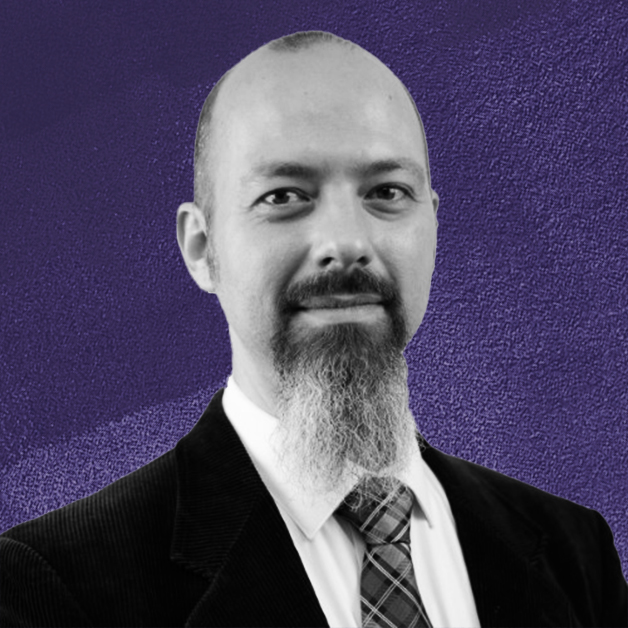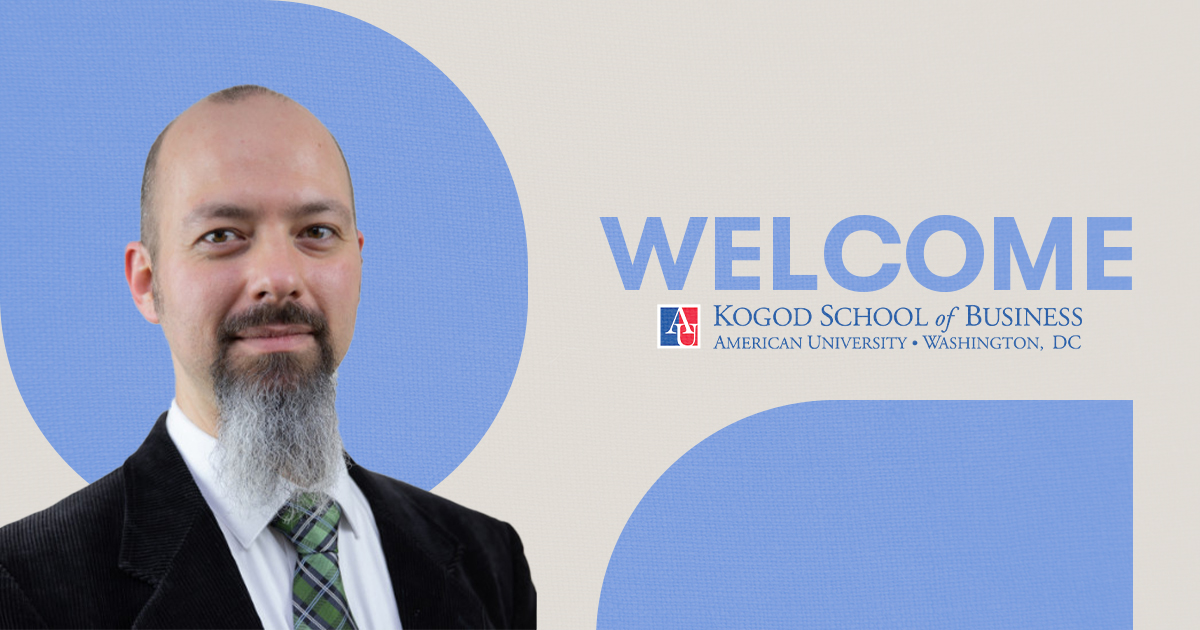
Jamie McCrary
For Shawn Janzen, an interdisciplinary approach is the only way to effectively solve complex business problems. The new MS analytics professor melds sociotechnical cybersecurity—a field that views cybersecurity through social, economic, and technical lenses—with IT and innovation policy to create his unique methodology for viewing management.
Janzen hopes to use this interdisciplinary perspective to help cybersecurity leaders optimize their decision-making and better protect their organizations.
“Even more than cybersecurity, I’m interested in how individuals behave and make choices,” says Janzen. “How do cybersecurity managers make decisions, and how can we empower them with the information they need to protect their companies?”
A forthcoming graduate of the University of Maryland College of Information Studies (UMD iSchool), a school that gathers researchers of different disciplines to help innovate information technology, Janzen officially joined the Kogod faculty this July and will begin teaching his in-person analytics coursework this fall semester.
Read on to learn more about his research, how he’s applying it to his teaching at Kogod, and how he envisions creating a more sustainable world through business.
Kogod School of Business: How has studying at an iSchool influenced how you perceive your role in the business world?
Shawn Janzen: When I first came to Kogod, I didn't see myself as a classic business school professor. UMD’s iSchool was a melting pot of disciplines with faculty from across the subject matter spectrum. My area of sociotechnical cybersecurity is largely about organizational and managerial information behaviors, which situates well in both iSchool and business school settings. Ultimately, the difference between the iSchool and Kogod is a mission shift, more of a nudge. At the iSchool, the business community was often part of the research and teaching fabric; joining Kogod just makes my focus on business a bit more explicit than it already was.
In what ways has your interdisciplinary approach influenced your teaching and coursework?
Data analytics is perfect for interdisciplinary work because data itself isn’t discipline-specific. Analytics becomes disciplinary when we frame data with its metadata—where it came from, how it was collected, was it collected for a specific purpose…and so on—and apply questions, analytical techniques, and other methods of inquiry. So, when I teach data analysis, I encourage students to share multiple points of view and bring their previous experiences to the discussion. A student studying or working in economics will likely bring a different lens than someone studying business communications or ethics.
Just as we find value in individual diversity within our teams and organizations, there is also value in approaching the data analysis process from different disciplinary perspectives.
Many of the problems we face in society are complex, wicked problems that will require interdisciplinary solutions. Getting students to work and think in an interdisciplinary way will equip them to be more effective and innovative leaders."

Shawn Janzen
Professor of Information Technology and Analytics, Kogod School of Business
How does this connect to your longer-term vision for your work at Kogod?
The more I get involved with the analytics program, the more I want to integrate it into other areas at Kogod. I’m interested in expanding the MS in Analytics program so it has a deeper connection with other courses and topics. How can analytics support the MBA program? How does analytics support sustainability management? What about the marketing program? Just like information science, you can apply analytics to any other subject. I think this will help students have more of a seamless experience, not just at Kogod but across AU.
You’re about to complete your dissertation. Can you give us an overview of your research?
Critical infrastructure organizations keep our country running: power plants, hospitals, manufacturing, grocery stores—anything considered critical to our nation’s economy, public health, safety, and security. These organizations have cybersecurity managers making risk decisions about how to keep the organization safe and what types of protective technology they need. Meanwhile, there are thousands of vendors trying to sell them cybersecurity and risk products. Essentially, my dissertation asks cybersecurity leaders two core questions: What cybersecurity products are you using, and why are you using them? I want to know how leaders acquire information and knowledge, especially if there are deficits, and how that translates into their decision-making.
Could you share a tangible example of how this might apply to the business world?
Think about cities that want to become smart cities—urban areas using different types of technology and data analytics at a massive, integrated scale to improve their systems, policy, and public services. Most mayors and their staff aren’t cybersecurity or technology experts, yet they are deciding how to keep their cities safe. Typically, they’ll rely on consultants to advise them on which business technology vendors to choose. Sometimes those consultants also want to be the technology vendors. You could use my research to understand how these city leaders decide what technology to implement to become a smart city. How do they get and use the information they need when facing pressure from people who are more informed?
What’s next after you’re settled into your new role at Kogod?
I plan to get more involved with the cyber community at American University to work with experts across different schools. I want to get more involved with the Khan Cyber and Economic Security Institute, which helps advance research and education on the efficacy of digital systems. I’m also excited to learn more and get involved with the Kogod Cybersecurity Governance Center, which takes a multidisciplinary cybersecurity and privacy research approach. My external research often involves national security and intelligence work, so I also hope to bring additional value to Kogod through joint research opportunities for faculty and experiential learning for students. So, just starting to work with the Kogod and AU communities and hopefully get people fired up and excited for new things.
The greatest impact I can have isn’t through a journal or a conference paper—it’s by influencing those who are making real business decisions."

Shawn Janzen
Professor of Information Technology and Analytics, Kogod School of Business
What impact do you envision your work having in business and beyond?
The greatest impact I can have isn’t through a journal or a conference paper—it’s by influencing those who are making real business decisions. With my dissertation, for instance, I plan to take the executive summary and present it to cybersecurity leaders across industries and government. I want to share my research from the perspective of, “Hey, here’s what your peers are doing and saying. Is there something useful you can learn from it?” Cybersecurity information sharing is vast and sometimes required. It has the potential to create tangible changes in the business world and provide positive spillover into society.
Learn more about Janzen and his work at american.edu/kogod/faculty/janzen.cfm
